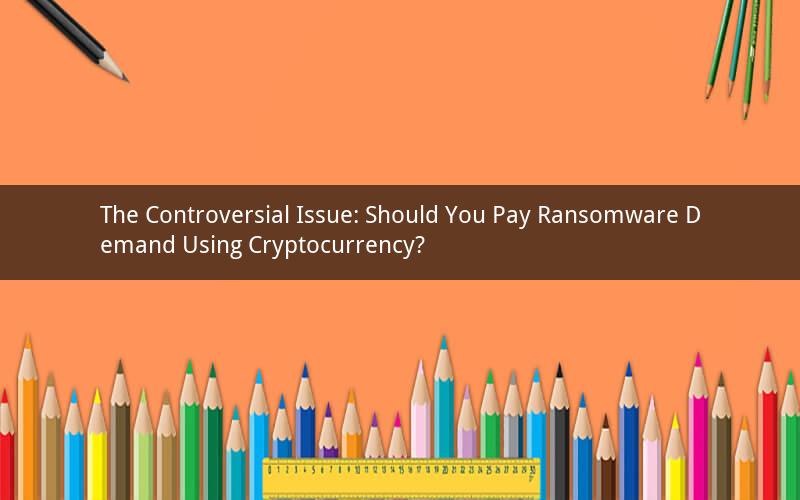
In the digital age, ransomware attacks have become a common occurrence, causing immense damage to individuals, businesses, and organizations worldwide. When faced with such a situation, one of the most debated questions is whether one should pay the ransom demand using cryptocurrency. This article delves into the various aspects of this controversial topic, exploring the potential risks and benefits associated with this decision.
1. Understanding Ransomware Attacks
Ransomware is a type of malicious software that encrypts a victim's files, rendering them inaccessible until a ransom is paid. The attackers typically demand payment in cryptocurrency, such as Bitcoin, due to its anonymity and untraceability.
1.1 How Ransomware Attacks Occur
Ransomware attacks can occur through various means, including phishing emails, malicious downloads, and compromised websites. Once the malware is installed, it starts encrypting the victim's files, demanding a ransom for their release.
1.2 The Role of Cryptocurrency in Ransomware Attacks
Cryptocurrency has become the preferred payment method for ransomware attackers due to its anonymous nature. This makes it difficult for law enforcement agencies to trace the attackers and recover the funds.
2. The Case for Paying Ransomware Demands
Advocates for paying ransomware demands argue that doing so may be the only way to recover the encrypted files and minimize the impact of the attack.
2.1 The Importance of Data Recovery
For many individuals and businesses, data is invaluable. Paying the ransom may be the only way to regain access to critical files, ensuring that operations can continue smoothly.
2.2 The Cost of Data Breach Recovery
The cost of recovering from a ransomware attack can be astronomical. This includes the cost of hiring cybersecurity experts, restoring data from backups, and addressing any potential legal or regulatory issues.
3. The Case Against Paying Ransomware Demands
Opponents of paying ransomware demands argue that doing so encourages attackers to continue their activities, leading to more attacks and potentially larger ransom demands.
3.1 The Risk of Further Attacks
By paying the ransom, individuals and businesses may inadvertently encourage attackers to target them again. This can lead to a cycle of ransomware attacks, with each subsequent attack demanding a higher ransom.
3.2 The Impact on Cybersecurity
Paying ransomware demands can undermine cybersecurity efforts. It sends a message that ransom payments are a viable option, potentially incentivizing more attackers to engage in this criminal activity.
4. Alternatives to Paying Ransomware Demands
Instead of paying the ransom, there are several alternatives that individuals and businesses can consider to mitigate the impact of a ransomware attack.
4.1 Data Backup and Recovery
Maintaining regular backups of critical data is essential. In the event of a ransomware attack, having recent backups can help minimize the impact and reduce the need for ransom payments.
4.2 Cybersecurity Training and Awareness
Educating employees about cybersecurity best practices can help prevent ransomware attacks. This includes identifying phishing emails, avoiding suspicious downloads, and adhering to strong password policies.
4.3 Collaboration with Law Enforcement
Reporting ransomware attacks to law enforcement agencies can help in identifying and apprehending the attackers. This can lead to a decrease in the overall number of ransomware attacks.
5. Conclusion
The decision to pay ransomware demands using cryptocurrency is a highly controversial issue. While there are arguments for and against paying the ransom, it is essential to consider the potential risks and benefits associated with this decision. Ultimately, the best approach is to focus on prevention, data backup, and collaboration with law enforcement agencies to combat ransomware attacks effectively.
Questions and Answers:
1. Q: What is the most common cryptocurrency used for ransomware payments?
A: Bitcoin is the most commonly used cryptocurrency for ransomware payments due to its anonymity and untraceability.
2. Q: Can paying the ransom guarantee that your data will be recovered?
A: There is no guarantee that paying the ransom will result in the recovery of your data. Some attackers may fail to provide the decryption key after receiving the payment.
3. Q: Are there any legal implications of paying ransomware demands?
A: Paying ransomware demands is illegal in many jurisdictions. It is important to consult with legal professionals before making any decisions regarding ransom payments.
4. Q: Can ransomware attacks be prevented?
A: Yes, ransomware attacks can be prevented through cybersecurity measures, such as maintaining regular backups, educating employees about cybersecurity best practices, and implementing strong password policies.
5. Q: What should individuals and businesses do if they are targeted by ransomware?
A: If individuals or businesses are targeted by ransomware, they should immediately disconnect from the network to prevent the spread of the malware. They should then report the attack to law enforcement agencies and seek assistance from cybersecurity experts to recover their data and restore operations.